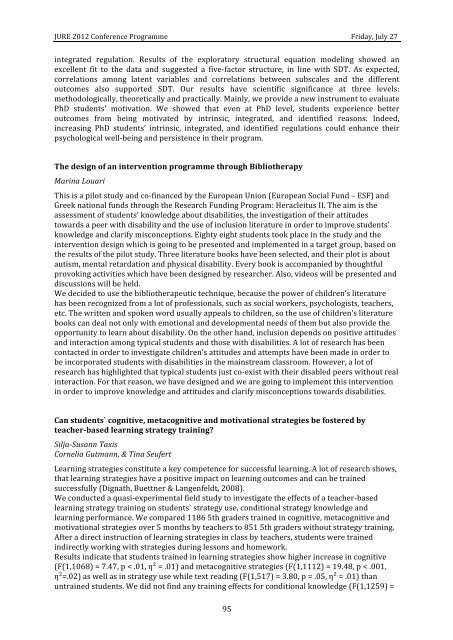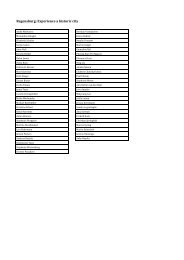JURE 2012 Programme book - EARLI Jure 2012
JURE 2012 Programme book - EARLI Jure 2012
JURE 2012 Programme book - EARLI Jure 2012
You also want an ePaper? Increase the reach of your titles
YUMPU automatically turns print PDFs into web optimized ePapers that Google loves.
<strong>JURE</strong> <strong>2012</strong> Conference <strong>Programme</strong> Friday, July 27<br />
integrated regulation. Results of the exploratory structural equation modeling showed an<br />
excellent fit to the data and suggested a five-‐factor structure, in line with SDT. As expected,<br />
correlations among latent variables and correlations between subscales and the different<br />
outcomes also supported SDT. Our results have scientific significance at three levels:<br />
methodologically, theoretically and practically. Mainly, we provide a new instrument to evaluate<br />
PhD students' motivation. We showed that even at PhD level, students experience better<br />
outcomes from being motivated by intrinsic, integrated, and identified reasons. Indeed,<br />
increasing PhD students’ intrinsic, integrated, and identified regulations could enhance their<br />
psychological well-‐being and persistence in their program.<br />
The design of an intervention programme through Bibliotherapy<br />
Marina Louari<br />
This is a pilot study and co-‐financed by the European Union (European Social Fund – ESF) and<br />
Greek national funds through the Research Funding Program: Heracleitus II. The aim is the<br />
assessment of students’ knowledge about disabilities, the investigation of their attitudes<br />
towards a peer with disability and the use of inclusion literature in order to improve students’<br />
knowledge and clarify misconceptions. Eighty eight students took place in the study and the<br />
intervention design which is going to be presented and implemented in a target group, based on<br />
the results of the pilot study. Three literature <strong>book</strong>s have been selected, and their plot is about<br />
autism, mental retardation and physical disability. Every <strong>book</strong> is accompanied by thoughtful<br />
provoking activities which have been designed by researcher. Also, videos will be presented and<br />
discussions will be held.<br />
We decided to use the bibliotherapeutic technique, because the power of children’s literature<br />
has been recognized from a lot of professionals, such as social workers, psychologists, teachers,<br />
etc. The written and spoken word usually appeals to children, so the use of children’s literature<br />
<strong>book</strong>s can deal not only with emotional and developmental needs of them but also provide the<br />
opportunity to learn about disability. On the other hand, inclusion depends on positive attitudes<br />
and interaction among typical students and those with disabilities. A lot of research has been<br />
contacted in order to investigate children’s attitudes and attempts have been made in order to<br />
be incorporated students with disabilities in the mainstream classroom. However, a lot of<br />
research has highlighted that typical students just co-‐exist with their disabled peers without real<br />
interaction. For that reason, we have designed and we are going to implement this intervention<br />
in order to improve knowledge and attitudes and clarify misconceptions towards disabilities.<br />
Can students` cognitive, metacognitive and motivational strategies be fostered by<br />
teacher-‐based learning strategy training?<br />
Silja-‐Susann Taxis<br />
Cornelia Gutmann, & Tina Seufert<br />
Learning strategies constitute a key competence for successful learning. A lot of research shows,<br />
that learning strategies have a positive impact on learning outcomes and can be trained<br />
successfully (Dignath, Buettner & Langenfeldt, 2008).<br />
We conducted a quasi-‐experimental field study to investigate the effects of a teacher-‐based<br />
learning strategy training on students` strategy use, conditional strategy knowledge and<br />
learning performance. We compared 1186 5th graders trained in cognitive, metacognitive and<br />
motivational strategies over 5 months by teachers to 851 5th graders without strategy training.<br />
After a direct instruction of learning strategies in class by teachers, students were trained<br />
indirectly working with strategies during lessons and homework.<br />
Results indicate that students trained in learning strategies show higher increase in cognitive<br />
(F(1,1068) = 7.47, p < .01, η² = .01) and metacognitive strategies (F(1,1112) = 19.48, p < .001,<br />
η²=.02) as well as in strategy use while text reading (F(1,517) = 3.80, p = .05, η² = .01) than<br />
untrained students. We did not find any training effects for conditional knowledge (F(1,1259) =<br />
95



